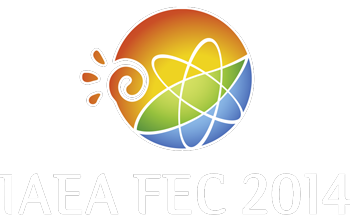Speaker
Dr
Alexey Gurchenko
(Ioffe Institute)
Description
The interaction between large-scale mean E×B flows, geodesic acoustic modes (GAM) and small-scale drift-wave turbulence has been an important area of experimental research for anomalous transport of energy and particles in toroidal plasmas during the last decade utilizing more and more sophisticated tools.
In this paper results of investigation of the interplay of GAMs and broadband drift wave turbulence of different spatial scales performed in the FT-2 tokamak by the enhanced scattering (ES), Doppler reflectometry and standard reflectometry as well as by global gyrokinetic modeling are presented.
The turbulence and GAMs local properties were investigated in hydrogen and deuterium regimes. A number of important effects indicating the role of turbulence in GAM excitation, GAMs role in transport phenomena and the mechanism GAMs control the turbulence and transport are presented and discussed.
A systematically larger level of GAMs amplitude in deuterium regime in comparison with hydrogen accompanied by smaller level of the electron thermal diffusivity became the striking example of the isotope effect. The weak influence of the GAM intermittency was observed both in H and D regimes in the small-scale turbulence radial wave number spectra obtained by correlative ES diagnostic. On contrary, a strong modulation of the large-scale turbulence level at the GAM frequency was found for the first time by cross-method utilizing both ES and reflectometry techniques. The modulation of the total reflectometric power and corresponding turbulence level by GAM was observed in the equatorial plane where the GAM density component is absent. The turbulence modulation at the GAM frequency is also studied using the FT-2 global gyrokinetic modeling by ELMFIRE code.
| Country or International Organisation | Russian Federation |
|---|---|
| Paper Number | EX/11-2Ra |
Author
Dr
Alexey Gurchenko
(Ioffe Institute)
Co-authors
Mr
Alexey Altukhov
(Ioffe Institute)
Mr
Arthur Perevalov
(Ioffe Institute)
Dr
Denis Kouprienko
(Ioffe Institute)
Prof.
Evgeniy Gusakov
(Ioffe Physical-Technical Institute of Russian Academy of Science)
Mr
Lev Esipov
(Ioffe Institute)
Dr
Michael Kantor
(Ioffe Institute)
Mr
Paavo Niskala
(Aalto University School of Science)
Dr
Sergey Lashkul
(Ioffe Physical Technical Institute,)
Dr
Susan Leerink
(Aalto University School of Science)

